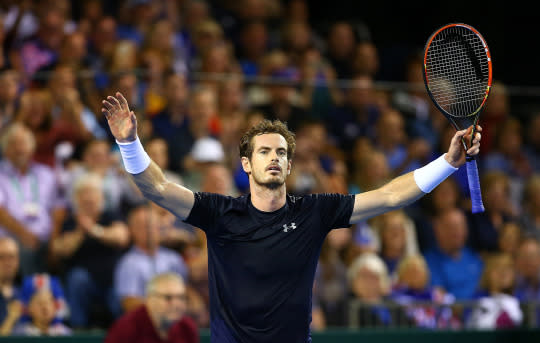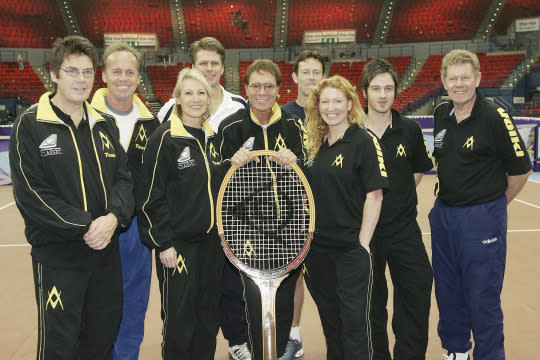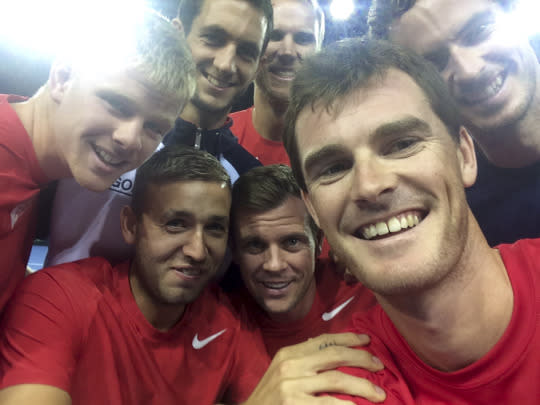WHERE ARE THEY NOW: Mark Cox – 1978 Davis Cup runner-up tips ‘best ever Brit’ Andy Murray and his team to rise to victory
James Matthews interviews Mark Cox, part of the last British team to play in the Davis Cup final, ahead of this weekend’s showdown in Belgium.

Thirty-seven years ago, Mark Cox fell at the last hurdle as he and his fellow British Davis Cup team were beaten in the final - but he is backing the class of 2015 to go one better and lift the trophy in Belgium this weekend.
Cox, who still plays tennis at the age of 73, was one quarter of the British team beaten by the United States in 1978. Along with John and David Lloyd and Buster Mottram, they fell agonisingly short of winning the prestigious title.
But as Andy Murray and co prepare to take on Belgium in the Davis Cup final in Ghent on Friday Cox predicted: “I think it will be 3-1. Andy Murray will win his two rubbers and we will win the doubles.
“Andy has demonstrated he thrives in difficult circumstances and atmospheres and he’s got that desire to carry the flag. The Davis Cup does something to him – that opportunity to lead the country. One hopes he can win the final. I expect him to do so.
“The pressure is quite great on Belgium at home. The pressure is on (David) Goffin and (Steve) Darcis and in my mind Andy Murray can win and even whoever is the second singles player – I would go for James Ward over Kyle Edmund – could win too.”

Cox also had to travel for the final in 1978, taking on the United States and a young John McEnroe in California.
Despite heroics from Mottram in the second rubber to come from two sets down to win in five, that was the only point earned in a 4-1 defeat.
“From a British point of view it was a very big thing. We hadn’t won since 1936 and it was a historical moment,” recalled Cox.
“America were a very strong team. John McEnroe did have a decent reputation and he was clearly a player with outstanding stature. He demonstrated that and played a superb game against John Lloyd. I think he started with an ace.
“The main rubber was Buster Mottram, who put in a terrific effort. Buster came from two sets down to win in five.
“But we were not used to the playing surface. It was not best suited to our game - we played mostly indoors or on grass in the Davis Cup that year.”
That was Cox’s last real shot at glory. Having reached a high of 13th in the world, he was slipping down the rankings and “on the decline” at the time and played in his last major at Wimbledon in 1981.
But that hasn’t been the end of his tennis story.
Five years on the seniors tour was followed by roles with the British Davis Cup and Fed Cup teams. He then spent a decade of employment with the LTA working with the next generation of tennis stars.
Cox continues to play, representing his home county of Leicestershire in seniors tennis as well as acting as president for the regional governing body. He may yet have one more part to play in the future of British tennis by unearthing the next Andy Murray.
But this weekend, he believes, could be a big moment for British tennis.

It would be the first British success since 1936, when the great Fred Perry and Bunny Austin were in their pomp and leading the nation to the last of the nine successes.
The Murray brothers, Andy and Jamie – who will play together in the doubles – will be the key this time and Cox added: “Andy has been the centre of the team along with his brother, who has flourished and is an excellent doubles player.”
Their performances have been crucial throughout the entire run to the final, although it couldn’t have been achieved without the contributions of James Ward, Kyle Edmund and Dan Evans.
Andy Murray has been the flag-bearer, creating a strong team unit around him in tandem with coach Leon Smith, and Cox is, convinced Britain has never had a better player than the current world number two.
“Andy Murray is an amazing player,” said Cox, who reached a career-best 13th in the world. “He’s one of the best in the world.
“If you look at pre-war, Fred Perry won Wimbledon three times in a row. But circumstances were different then. It wasn’t professional in those days and there were 40-50 British players playing.
“The competition now is quite different and much tougher. In that respect, what Murray has achieved is immense.”

 Yahoo Sport
Yahoo Sport 






































